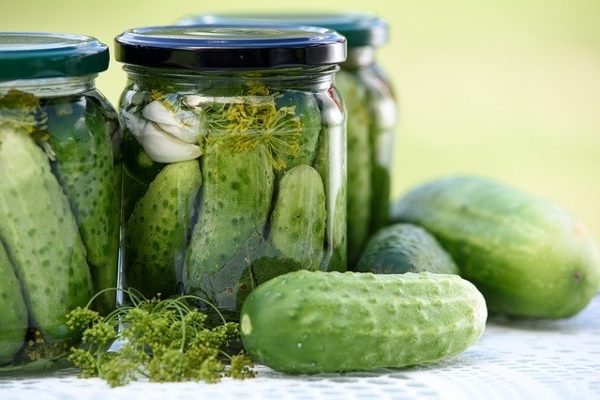 You’re in the middle of enjoying a delicious crunchy pickle when you look over and see your furry canine friend eyeballing it. Your cute pup tilts his head to the side, asking you to give him a bite. You can’t say no to that face and you give in. You toss him a bite before you even stop to think whether or not pickles are safe for dogs to eat. Are pickles safe for dogs?
You’re in the middle of enjoying a delicious crunchy pickle when you look over and see your furry canine friend eyeballing it. Your cute pup tilts his head to the side, asking you to give him a bite. You can’t say no to that face and you give in. You toss him a bite before you even stop to think whether or not pickles are safe for dogs to eat. Are pickles safe for dogs?
Can Dogs Eat Pickles?
Luckily, you can probably relax knowing that it is usually safe to feed your dog an occasional pickle. Generally, pickles are not toxic to dogs. They do, however, contain a great deal of sodium and have little other nutritional value. Dogs don’t need additional sodium in their diet because they already get the daily-recommended value from their dog food.
Consuming extra sodium isn’t usually harmful if it only occurs once in a great while. However, regularly consuming high amounts of sodium could cause your dog to develop high blood pressure, which could result in a stroke or heart attack. Additionally, high sodium treats are not safe for dogs that have heart conditions or other serious health issues.
Don’t let your furry friend consume a copious amount of pickles in one sitting. This could subject your dog to an unhealthy amount of sodium. Your dog could develop hypernatremia, which means there is too much salt in the blood.
If you discover that your dog has eaten a large portion of pickles, monitor your dog closely. Symptoms of hypernatremia to watch for include thirst, diarrhea, vomiting, confusion and seizures. If your dog exhibits these symptoms, get your dog to a veterinarian immediately.
Sweet pickles contain less sodium than dill pickles. They are a slightly healthier choice, but still should only be fed to dogs once in a while.
Dangerous Pickles
There are certain spices and vegetables used in pickling that can be harmful to dogs. Some spices can cause gastrointestinal upset. Garlic and onions are particularly dangerous. This includes pickled onions and garlic as well as other pickled vegetables that have been cooked with garlic or onions.
Onions contain thiosulphate, which is very harmful to dogs. Thiosulphate is known to cause hemolytic anemia, or Heinz body anemia. This is a serious condition that causes red blood cells to burst and it can be fatal. It can occur several days after your dog eats onions. Treatment can include blood transfusions.
If you suspect your dog has eaten onions, watch your dog closely for symptoms of hemolytic anemia. If your dog experiences vomiting, diarrhea, dark urine or breathing difficulties, take your dog to the vet immediately.
Should You Give Your Dog Pickle Juice?
You may have heard that pickle juice can be given to dogs when they are dehydrated. However, that is never a good idea. Pickle juice is full of electrolytes, but it has too much sodium. Even if you dilute it with water, there is still too much sodium. There are much better options for hydrating your dog. You should always consult with your veterinarian if you suspect your dog is dehydrated.
Final Thoughts on Pickles for Your Pup
Pickles are generally safe for your dog to eat in small amounts as long as they don’t contain garlic, onions or other harmful spices. So you likely won’t have anything to worry about if your dog eats the occasional pickle. However, pickles aren’t really a great treat for dogs.
Pickles and pickle juice contain too much sodium and can become harmful if consumed regularly or in large amounts. There are much better treat options for your dog. Instead, consider feeding your dog fresh raw vegetables that haven’t been pickled, like cucumbers or carrots.

Hi, I am Andrew. I am the editor at FamilyWithPets. I am enjoy learning and sharing information about pets that helps enrich the lives of pets and pet parents.
